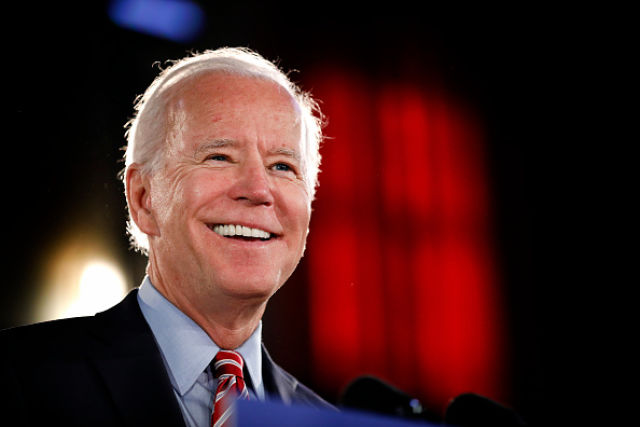 President Joe Biden. (Getty Images)
President Joe Biden. (Getty Images)
Business Day
In 1986, as the apartheid regime resisted international pressure, an ambitious Democratic senator from Delaware launched into a passionate rebuke of US government policy towards the pariah state.
Challenging secretary of state George Shultz on the ambiguity of Reagan administration policy, the energetic senator offered vocal support to the embattled black population of SA in a committee hearing.
“Dammit, we have favourites in SA. The favourites in SA are the people that are being repressed by an ugly white regime. We have favourites! Our loyalty is not to SA, it’s to South Africans. And the South Africans are majority black. They are being excoriated!”
Thirty-four years later, nearly two weeks after his victory over Donald Trump, that senator — now US President Joe Biden — spoke to President Cyril Ramaphosa, his first call with an African head of state after the election win. The leaders recalled Biden’s earlier visit to SA during the “dark days of apartheid”, and spoke of Biden’s recognition of Africa as “a major player in international affairs and in the advancement of multilateralism”.
Such a rapport would have been unthinkable during the administration of Trump, whose attention in the 1980s was not directed towards apartheid but to real estate, the gossip columns of New York tabloids and Manhattan’s Studio 54 nightclub.
Throughout his one-term presidency, Trump’s engagement with Africa appeared scarcely more developed, as relations with the continent flitted between perfunctory and hostile. From launching an attempted travel ban on citizens from Muslim-majority countries including Libya, Somalia and Sudan to reportedly dismissing some African nations as “sh*thole countries” in an unrecorded Oval Office meeting, Trump did little to play down his “America First” stereotype.
Disengagement went beyond tactless comments. While Trump saw Africa as an arena for US competition with China, important diplomatic posts in Africa went unfilled and he failed to visit the continent. Now with Biden at the helm, US foreign policy experts hope an outward-looking presidency will re-engage with Africa by resetting trade policy, boosting investment and co-operating on security and climate change. But after four years of drift, it will take more than a change of tone to re-establish the US as a big partner.
“I think US diplomatic relations with African states have not been given the level of seriousness or mutual respect they deserved under the Trump administration,” says Grant Harris, CEO of Harris Africa Partners and a senior director for African affairs in Barack Obama’s White House.
“Under Trump, the US didn’t even have an ambassador in SA for two and a half years, a lot of ambassadorships were slow to appoint, embassies were understaffed, and Trump said racist things about the continent. Trade and investment ties with Africa received little to no high-level attention, the president was not engaged and didn’t travel. There weren’t champions in the cabinet who understood the importance of increasing trade in and within African markets. Biden brings literally decades of experience on foreign policy issues. For decades he’s understood the importance of strong relations with African states.”
Yet even Trump’s critics concede that behind the crass exterior and shocking faux pas, the former president’s transactional instincts shaped the outlines of an African commercial strategy that Biden can build on.
“With the Trump Africa policy, the tone was wrong — it was derisive, dismissive, disrespectful. Obviously that was a problem and we lacked senior-level engagement,” says Aubrey Hruby, a Washington DC-based Africa investment adviser. “However, there were interesting positive aspects of the last four years that I hope are continued into the new administration. One was a focus on the commercial aspects of US-Africa policy.”
On October 5 2018, Trump signed into law the Better Utilization of Investments Leading to Development Act (Build), which established the US International Development Finance Corporation (DFC), a new development bank that will invest in sectors across the emerging world including energy, health care, infrastructure and technology.
The act gave DFC a lending capacity of $60bn, double that of its forerunner, the Overseas Private Investment Corporation — an organisation Trump considered scrapping before being convinced by allies that US overseas finance could combat the influence of a rising China. The unlikely product of the Trump era could become a game-changer driving US investment in Africa.
“The high point, the single most positive legacy of the Trump administration in my mind, will be the creation of the DFC. That is really important, that has a lot of potential,” says Harris. “It gives more resources and flexibility to the US government to support companies. It’s a work in progress, the statutory authority is there, the resources are increased. The DFC currently has about $8bn worth of exposure to Africa, which is over half its exposure currently.”
While it’s too early to judge the DFC’s influence, its creation — and that of Trump’s Prosper Africa initiative, which combines the resources of more than 15 government agencies to connect US and African businesses — offers a timely boost to US development finance capabilities as Africa emerges from the economic ruin of the Covid-19 pandemic.
—
UPDATE: U.S. Senate Confirms Blinken as Secretary of State in Biden Administration
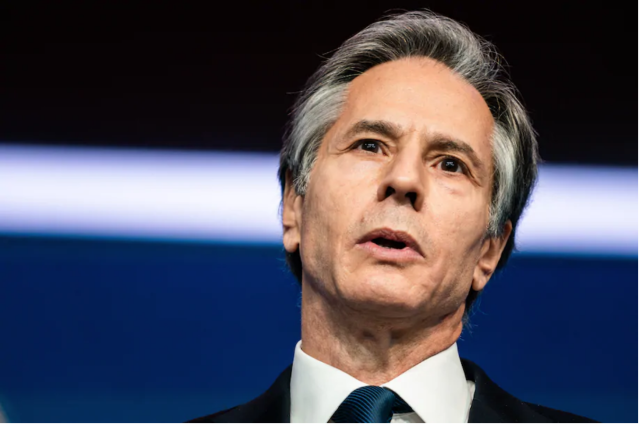
Antony Blinken served as deputy secretary of state in the Obama administration and is one of Biden’s closest and longest-serving foreign policy advisers. He will succeed Mike Pompeo as the nation’s top diplomat. (The Washington Post)
The Washington Post
Updated: January 26th, 2021
Blinken, Biden’s nominee to become secretary of state, won Senate confirmation Tuesday, becoming the fourth member of the new president’s Cabinet to clear that hurdle.
The vote was 78 to 22.
Blinken served as deputy secretary of state in the Obama administration and is one of Biden’s closest and longest-serving foreign policy advisers.
He will succeed Mike Pompeo as the nation’s top diplomat as the new administration faces numerous challenges from China, Iran, Russia and North Korea.
Ahead of Tuesday’s vote, Schumer hailed Biden’s choice.
“Mr. Blinken is just the right person to rebuild and reassert America’s national security prerogatives on the national stage and reestablish the first instrument of American power: diplomacy,” the Senate majority leader said.
The Senate Foreign Relations Committee approved Blinken’s nomination in a 15-to-3 vote Monday, clearing the way for it to be taken up on the Senate floor.
Blinken was staff director of the committee when Biden, as a senator from Delaware, was its chairman. Blinken later joined the Obama administration as a senior adviser to Biden when he was vice president.
The Senate has confirmed Avril Haines as Biden’s director of national intelligence, Lloyd Austin as his defense secretary and Janet Yellen as his treasury secretary.
Nearly a week into Biden’s presidency, several other picks are moving forward.
The Senate Homeland Security Committee on Tuesday advanced Alejandro Mayorkas’s nomination for secretary of homeland security. Mayorkas served as Department of Homeland Security deputy secretary under President Barack Obama.
And the Senate Committee on Commerce, Science and Transportation is holding a hearing Tuesday on Gina Raimondo’s nomination to be secretary of commerce. Raimondo (D) is serving as governor of Rhode Island.
—
UPDATE: Controversial Head of VOA Resigns at President Biden’s Request
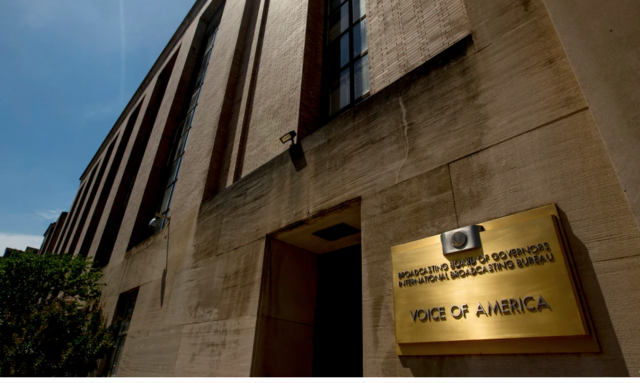
Michael Pack, a Trump appointee who sought to remake the Voice of America, resigned on Wednesday, bringing an end to a short and tumultuous tenure. He said that his resignation came at Biden’s request. Biden is expected to name a replacement, although no successor was announced on Wednesday. (Photo: Voice of America headquarters on Capitol Hill/The Washington Post)
Controversial head of Voice of America resigns hours after President Biden takes office
Updated: Jan. 20, 2021
Michael Pack, a Trump appointee who sought to remake the Voice of America and other government-funded overseas news agencies, resigned on Wednesday, bringing an end to a short and tumultuous tenure.
Pack quit a few hours after President Biden took office and less than eight months into his three-year term as chief executive of the U.S. Agency for Global Media (USAGM). The government agency oversees VOA, Radio Free Europe/Radio Liberty, the Office of Cuba Broadcasting and other networks that produce and distribute news to millions of people in countries whose governments suppress independent reporting.
He said that his resignation came at Biden’s request. During the president campaign, Biden’s staff had signaled that he would replace Pack if Biden won election.
Biden is expected to name a replacement from within USAGM, although no successor was announced on Wednesday.
Pack, a former documentary filmmaker who has worked with former Trump adviser Steve K. Bannon, left a trail of controversies, lawsuits and general criticism inside and around the agencies he oversaw.
He characterized his efforts — which included replacing top managers and asserting the right to direct VOA’s newsgathering, despite a firewall of regulations intended to keep the news product independent — as an attempt to restore the venerable news agency’s tradition of nonpartisan reporting. Critics, however, saw his initiatives as an effort to turn VOA into a mouthpiece for the Trump administration.
How Trump’s obsessions with media and loyalty coalesced in a battle for Voice of America
“I firmly believe that — thanks to your support, patriotism, and understanding — a great amount of much-needed reform was achieved in the past eight months,” Pack wrote in a resignation letter to staff on Wednesday.
He added: “USAGM and the CEO position are meant to be non-partisan. As such, every single day, I was solely focused upon reorienting the agency toward its mission. I sought, above all, to help the agency share America’s story with the world objectively and without bias.”
Others inside USAGM and VOA strongly disagreed with that self-assessment.
One VOA journalist said Pack’s resignation triggered “sighs of relief and cheers” among employees.
“Most if not all of us are celebrating Pack’s resignation as the first step toward a return to normalcy,” the journalist said, speaking on condition of anonymity because she isn’t authorized to comment.
She said she was among a number of staff members who are hopeful that the director and deputy director appointed by Pack, Robert Reilly and Elizabeth Robbins, respectively, would soon follow Pack out the door. “They must be removed immediately or the damage to the credibility of the VOA brand will be permanent,” she said.
Pack swept aside top managers of USAGM and the directors of the agencies under his supervision, replacing them with a cadre of conservative appointees. Reilly and Robbins have been on the job for just the past month.
It’s not clear whether Pack’s appointees, including those on supervisory boards, will be replaced by Biden.
He also declined to renew the expiring visas of foreign journalists who work for VOA, saying that they had not been properly vetted and suggesting the agency was harboring foreign spies.
According to a whistleblower complaint filed Tuesday on behalf of former employees, Pack used about $2 million in taxpayer funds to hire a law firm to compile personnel dossiers on some of the managers he targeted for removal. The dossier were developed to support his decision to replace them, the complaint said.
Earlier this month, more than two dozen VOA employees objected to a directive, apparently from Pack, to broadcast a speech by Mike Pompeo, the outgoing secretary of state, at the agency’s headquarters in Washington. The employees said the mandate to carry the speech from a political appointee amounted to government “propaganda” — the very thing VOA was established to counter in countries abroad. They demanded the resignations of Reilly and Robbins.
Reilly did not allow reporters to question Pompeo at the event. He later demoted the agency’s White House correspondent, Patsy Widakuswara, after as she fired questions at Pompeo as he was leaving the building.
Pack did not respond to a request for comment, continuing a practice he has observed since his appointment began. Since June, he has given interviews only to conservative media outlets and to USAGM-supervised agencies.
—
UPDATE: Biden Sworn in as America’s 46th President
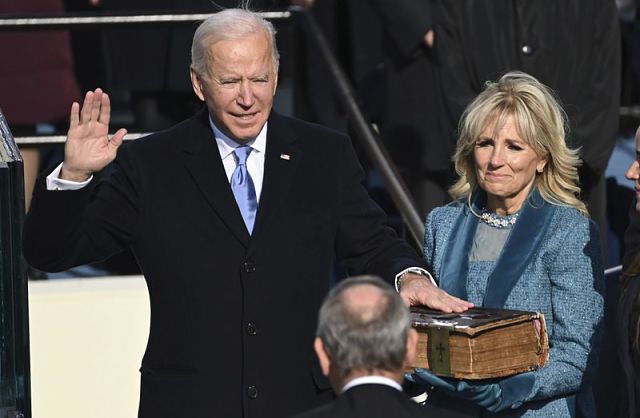
Joe Biden is sworn in as the 46th president of the United States by Chief Justice John Roberts as Jill Biden holds the Bible during the 59th Presidential Inauguration at the U.S. Capitol in Washington, Wednesday, Jan. 20, 2021. (Photo via AP)
The Associated Press
WASHINGTON (AP) — The Latest on Joe Biden’s presidential inauguration (all times local):
12:00
Joe Biden has officially become the 46th president of the United States.
Biden took the oath of office just before noon Wednesday during a ceremony at the U.S. Capitol. The presidential oath was administered by U.S. Supreme Court Chief Justice John Roberts.
Biden was sworn in using a Bible that has been in his family since 1893 and was used during his swearing-in as vice president in 2009 and 2013. The 5-inch thick Bible, which could be seen on a table next to Biden’s chair on the dais, has a Celtic cross on its cover and was also used each time he was sworn- n as a U.S. senator.
Biden’s late son, Beau, also used the Bible for his own swearing-in ceremony as attorney general of Delaware and helped carry the Bible to his father’s 2013 ceremony.
Inauguration Live Updates: Biden Takes Power as Trump Leaves White House
—
Facing crush of crises, Biden will take helm as president
The Associated Press
WASHINGTON (AP) — Joe Biden swears the oath of office at noon Wednesday to become the 46th president of the United States, taking the helm of a deeply divided nation and inheriting a confluence of crises arguably greater than any faced by his predecessors.
The very ceremony in which presidential power is transferred, a hallowed American democratic tradition, will serve as a jarring reminder of the challenges Biden faces: The inauguration unfolds at a U.S. Capitol battered by an insurrectionist siege just two weeks ago, encircled by security forces evocative of those in a war zone, and devoid of crowds because of the threat of the coronavirus pandemic.
Stay home, Americans were exhorted, to prevent further spread of a surging virus that has claimed more than 400,000 lives in the United States. Biden will look out over a capital city dotted with empty storefronts that attest to the pandemic’s deep economic toll and where summer protests laid bare the nation’s renewed reckoning on racial injustice.
He will not be applauded — or likely even acknowledged — by his predecessor.
Flouting tradition, Donald Trump planned to depart Washington on Wednesday morning ahead of the inauguration rather than accompany his successor to the Capitol. Trump, awaiting his second impeachment trial, stoked grievance among his supporters with the lie that Biden’s win was illegitimate.
Biden, in his third run for the presidency, staked his candidacy less on any distinctive political ideology than on galvanizing a broad coalition of voters around the notion that Trump posed an existential threat to American democracy. On his first day, Biden will take a series of executive actions — on the pandemic, climate, immigration and more — to undo the heart of Trump’s agenda. The Democrat takes office with the bonds of the republic strained and the nation reeling from challenges that rival those faced by Abraham Lincoln and Franklin D. Roosevelt.
“Biden will face a series of urgent, burning crises like we have not seen before, and they all have to be solved at once. It is very hard to find a parallel in history,” said presidential historian Michael Beschloss. “I think we have been through a near-death experience as a democracy. Americans who will watch the new president be sworn in are now acutely aware of how fragile our democracy is and how much it needs to be protected.”
Biden will come to office with a well of empathy and resolve born by personal tragedy as well as a depth of experience forged from more than four decades in Washington. At age 78, he will be the oldest president inaugurated.
More history will be made at his side, as Kamala Harris becomes the first woman to be vice president. The former U.S. senator from California is also the first Black person and the first person of South Asian descent elected to the vice presidency and will become the highest-ranking woman ever to serve in government.
The two will be sworn in during an inauguration ceremony with few parallels in history.
Tens of thousands of troops are on the streets to provide security precisely two weeks after a violent mob of Trump supporters, incited by the Republican president, stormed the Capitol in an attempt to prevent the certification of Biden’s victory.
The tense atmosphere evoked the 1861 inauguration of Lincoln, who was secretly transported to Washington to avoid assassins on the eve of the Civil War, or Roosevelt’s inaugural in 1945, when he opted for a small, secure ceremony at the White House in the waning months of World War II.
Despite security warnings, Biden declined to move the ceremony indoors and instead will address a small, socially distant crowd on the West Front of the Capitol. Some of the traditional trappings of the quadrennial ceremony will remain.
The day will begin with a reach across the aisle after four years of bitter partisan battles under Trump. Biden invited Mitch McConnell and Kevin McCarthy, the Republican leaders of the Senate and House, to join him at a morning Mass, along with Chuck Schumer and House Speaker Nancy Pelosi, the Democratic leaders.
Once at the Capitol, Biden will be administered the oath by Chief Justice John Roberts; Harris will be sworn in by Justice Sonia Sotomayor. The theme of Biden’s approximately 30-minute speech will be “America United,” and aides said it would be a call to set aside differences during a moment of national trial.
Biden will then oversee a “Pass in Review,” a military tradition that honors the peaceful transfer of power to a new commander in chief. Then, Biden, Harris and their spouses will be joined by a bipartisan trio of former presidents — Bill Clinton, George W. Bush and Barack Obama — to lay a wreath at the Tomb of the Unknown Soldier at Arlington National Ceremony.
Full Coverage: Biden’s inauguration
Later, Biden will join the end of a slimmed-down inaugural parade as he moves into the White House. Because of the pandemic, much of this year’s parade will be a virtual affair featuring performances from around the nation.
In the evening, in lieu of the traditional glitzy balls that welcome a new president to Washington, Biden will take part in a televised concert that also marks the return of A-list celebrities to the White House orbit after they largely eschewed Trump. Among those in the lineup: Bruce Springsteen, Justin Timberlake and Lin-Manuel Miranda. Lady Gaga will sing the national anthem at the Capitol earlier in the day.
Trump will be the first president in more than a century to skip the inauguration of his successor. He planned his own farewell celebration at nearby Joint Base Andrews before boarding Air Force One for the final time as president for the flight to his Florida estate.
Trump will nonetheless shadow Biden’s first days in office.
Trump’s second impeachment trial could start as early as this week. That could test the ability of the Senate, poised to come under Democratic control, to balance impeachment proceedings with confirmation hearings and votes on Biden’s Cabinet choices.
Biden was eager to go big early, with an ambitious first 100 days that includes a push to speed up the distribution of COVID-19 vaccinations to anxious Americans and pass a $1.9 trillion virus relief package. On Day One, he’ll also send an immigration proposal to Capitol Hill that would create an eight-year path to citizenship for immigrants living in the country illegally.
He also planned a 10-day blitz of executive orders on matters that don’t require congressional approval — a mix of substantive and symbolic steps to unwind the Trump years. Among the planned steps: rescinding travel restrictions on people from several predominantly Muslim countries; rejoining the Paris climate accord; issuing a mask mandate for those on federal property; and ordering agencies to figure out how to reunite children separated from their families after crossing the border.
The difficulties he faces are immense, to be mentioned in the same breath as Roosevelt taking office during the Great Depression or Obama, under whom Biden served eight years as vice president, during the economic collapse. And the solution may be similar.
“There is now, as there was in 1933, a vital need for leadership,” said presidential historian Doris Kearns Goodwin, “for every national resource to be brought to bear to get the virus under control, to help produce and distribute the vaccines, to get vaccines into the arms of the people, to spur the economy to recover and get people back to work and to school.”
___
UPDATE: Biden Outlines ‘Day One’ Agenda of Executive Actions
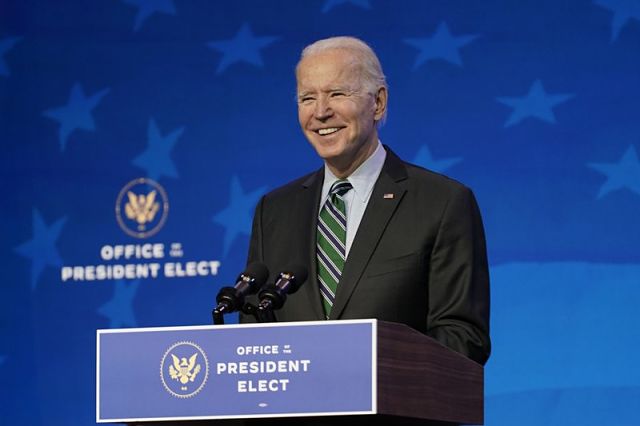
President-elect Joe Biden speaks during an event at The Queen theater, Saturday, Jan. 16, 2021, in Wilmington, Del. (AP Photo)
The Associated Press
WASHINGTON (AP) — In his first hours as president, Joe Biden plans to take executive action to roll back some of the most controversial decisions of his predecessor and to address the raging coronavirus pandemic, his incoming chief of staff said Saturday.
The opening salvo would herald a 10-day blitz of executive actions as Biden seeks to act swiftly to redirect the country in the wake of Donald Trump’s presidency without waiting for Congress.
On Wednesday, following his inauguration, Biden will end Trump’s restriction on immigration to the U.S. from some Muslim-majority countries, move to rejoin the Paris climate accord and mandate mask-wearing on federal property and during interstate travel. Those are among roughly a dozen actions Biden will take on his first day in the White House, his incoming chief of staff, Ron Klain, said in a memo to senior staff.
Other actions include extending the pause on student loan payments and actions meant to prevent evictions and foreclosures for those struggling during the pandemic.
“These executive actions will deliver relief to the millions of Americans that are struggling in the face of these crises,” Klain said in the memo. “President-elect Biden will take action — not just to reverse the gravest damages of the Trump administration — but also to start moving our country forward.”
“Full achievement” of Biden’s goals will require Congress to act, Klain wrote, including the $1.9 trillion virus relief bill he outlined on Thursday. Klain said that Biden would also propose a comprehensive immigration reform bill to lawmakers on his first day in office.
Providing a path to citizenship for millions of immigrants in the U.S. illegally will be part of Biden’s agenda, according to people briefed on his plans. Ali Noorani, president of the National Immigration Forum and among those briefed, said immigrants would be put on an eight-year path. There would be a faster track for those in the Deferred Action for Childhood Arrivals program, which shields people from deportation who came to the U.S. as children, and for those from strife-torn countries with temporary status.
On Thursday, the new president’s second day in office, Biden would sign orders related to the COVID-19 outbreak aimed at reopening schools and businesses and expanding virus testing, Klain said. The following day, Friday, will see action on providing economic relief to those suffering the economic costs of the pandemic.
In the following week, Klain said, Biden would take additional actions relating to criminal justice reform, climate change and immigration — including a directive to speed the reuniting of families separated at the U.S.-Mexico border under Trump’s policies.
More actions will be added, Klain said, once they clear legal review.
Incoming presidents traditionally move swiftly to sign an array of executive actions when they take office. Trump did the same, but he found many of his orders challenged and even rejected by courts.
Klain maintained that Biden should not suffer similar issues, saying “the legal theory behind them is well-founded and represents a restoration of an appropriate, constitutional role for the President.”
—
UPDATE: Biden Unveils $1.9 Trillion COVID-19 & Economic Plan
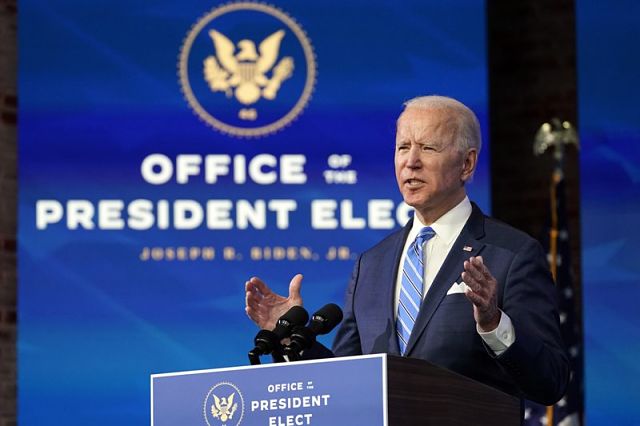
President-elect Joe Biden speaks about the COVID-19 pandemic during an event at The Queen theater, Thursday, Jan. 14, 2021, in Wilmington, Del. (AP photo)
The Associated Press
Updated: January 15th, 2021
Biden unveils $1.9 Trillion plan to stem COVID-19 and steady economy
WILMINGTON, Del. (AP) — President-elect Joe Biden has unveiled a $1.9 trillion coronavirus plan to end “a crisis of deep human suffering” by speeding up vaccines and pumping out financial help to those struggling with the pandemic’s prolonged economic fallout.
Called the “American Rescue Plan,” the legislative proposal would meet Biden’s goal of administering 100 million vaccines by the 100th day of his administration, and advance his objective of reopening most schools by the spring. On a parallel track, it delivers another round of aid to stabilize the economy while the public health effort seeks the upper hand on the pandemic.
“We not only have an economic imperative to act now — I believe we have a moral obligation,” Biden said in a nationwide address Thursday. At the same time, he acknowledged that his plan “does not come cheaply.”
Biden proposed $1,400 checks for most Americans, which on top of $600 provided in the most recent COVID-19 bill would bring the total to the $2,000 that Biden has called for. It would also extend a temporary boost in unemployment benefits and a moratorium on evictions and foreclosures through September.
And it shoehorns in long-term Democratic policy aims such as increasing the minimum wage to $15 an hour, expanding paid leave for workers, and increasing tax credits for families with children. The last item would make it easier for women to go back to work, which in turn would help the economy recover.
The political outlook for the legislation remained unclear. In a joint statement, House Speaker Nancy Pelosi and Senate Democratic leader Chuck Schumer praised Biden for including liberal priorities, saying they would move quickly to pass it after Biden takes office next Wednesday. But Democrats have narrow margins in both chambers of Congress, and Republicans will push back on issues that range from increasing the minimum wage to providing more money for states, while demanding inclusion of their priorities, such as liability protection for businesses.
“Remember that a bipartisan $900 billion #COVID19 relief bill became law just 18 days ago,” tweeted Sen. John Cornyn, R-Texas. But Biden says that was only a down payment, and he promised more major legislation next month, focused on rebuilding the economy.
“The crisis of deep human suffering is in plain sight, and there’s not time to waste,” Biden said. “We have to act and we have to act now.”
Still, he sought to manage expectations. “We’re better equipped to do this than any nation in the world,” he said. “But even with all these small steps, it’s going to take time.”
His relief bill would be paid for with borrowed money, adding to trillions in debt the government has already incurred to confront the pandemic. Aides said Biden will make the case that the additional spending and borrowing is necessary to prevent the economy from sliding into an even deeper hole. Interest rates are low, making debt more manageable.
Biden has long held that economic recovery is inextricably linked with controlling the coronavirus.
That squares with the judgment of the U.S. Chamber of Commerce, the most powerful business lobbying group and traditionally an adversary of Democrats. “We must defeat COVID before we can restore our economy and that requires turbocharging our vaccination efforts,” the Chamber said in a statement Thursday night that welcomed Biden’s plan but stopped short of endorsing it.
The plan comes as a divided nation is in the grip of the pandemic’s most dangerous wave yet. So far, more than 385,000 people have died of COVID-19 in the U.S. And government numbers out Thursday reported a jump in weekly unemployment claims, to 965,000, a sign that rising infections are forcing businesses to cut back and lay off workers.
Under Biden’s multipronged strategy, about $400 billion would go directly to combating the pandemic, while the rest is focused on economic relief and aid to states and localities.
About $20 billion would be allocated for a more disciplined focus on vaccination, on top of some $8 billion already approved by Congress. Biden has called for setting up mass vaccination centers and sending mobile units to hard-to-reach areas.
With the backing of Congress and the expertise of private and government scientists, the Trump administration delivered two highly effective vaccines and more are on the way. Yet a month after the first shots were given, the nation’s vaccination campaign is off to a slow start with about 11 million people getting the first of two shots, although more than 30 million doses have been delivered.
Biden called the vaccine rollout “a dismal failure so far” and said he would provide more details about his vaccination campaign on Friday.
The plan also provides $50 billion to expand testing, which is seen as key to reopening most schools by the end of the new administration’s first 100 days. About $130 billion would be allocated to help schools reopen without risking further contagion.
The plan would fund the hiring of 100,000 public health workers, to focus on encouraging people to get vaccinated and on tracing the contacts of those infected with the coronavirus.
There’s also a proposal to boost investment in genetic sequencing, to help track new virus strains including the more contagious variants identified in the United Kingdom and South Africa.
Throughout the plan, there’s a focus on ensuring that minority communities that have borne the brunt of the pandemic are not shortchanged on vaccines and treatments, aides said.
With the new proposals comes a call to redouble efforts on the basics.
Biden is asking Americans to override their sense of pandemic fatigue and recommit to wearing masks, practicing social distancing and avoiding indoor gatherings, particularly larger ones. It’s still the surest way to slow the COVID-19 wave, with more than 4,400 deaths reported just on Tuesday.
Biden’s biggest challenge will be to “win the hearts and minds of the American people to follow his lead,” said Dr. Leana Wen, a public health expert and emergency physician.
The pace of vaccination in the U.S. is approaching 1 million shots a day, but 1.8 million a day would be needed to reach widespread or “herd” immunity by the summer, according to a recent estimate by the American Hospital Association. Wen says the pace should be even higher — closer to 3 million a day.
Biden believes the key to speeding that up lies not only in delivering more vaccine but also in working closely with states and local communities to get shots into the arms of more people. The Trump administration provided the vaccine to states and set guidelines for who should get priority for shots, but largely left it up to state and local officials to organize their vaccination campaigns.
It’s still unclear how the new administration will address the issue of vaccine hesitancy, the doubts and suspicions that keep many people from getting a shot. Polls show it’s particularly a problem among Black Americans.
“We will have to move heaven and earth to get more people vaccinated,” Biden said.
Next Wednesday, when Biden is sworn in as president, marks the anniversary of the first confirmed case of COVID-19 in the United States.
—
Join the conversation on Twitter and Facebook.

























